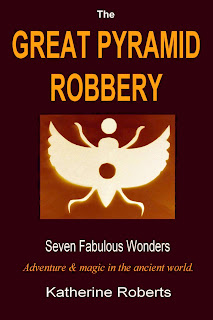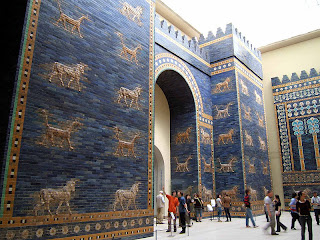The Great Pyramid Robbery - FREE for the holiday weekend!
 |
| FREE 3rd - 7th May CLICK HERE |
On a forum recently, someone asked for historical fiction recommendations for young readers. I had my Seven
Fabulous Wonders series very much in mind after redesigning the e-covers, and was just about to spring in with a reminder about these books when
I saw the slightly desperate "PS: NOT historical fantasy!”
It's true the fantasy genre has its own fans. Some historians dislike fiction authors who mess around with history, which is understandable. Historical fact
should remain historical fact (as long as you can be sure it is fact…something I won’t go into here!) But it got me thinking about that “ps”, and what it might mean
to those of us who write historical novels with a bit of magic in them too.
Although my Seven Fabulous Wonders books include things
that might look like pure fantasy, I did a fair amount of
historical research for this series – rather too much, according to the
Americans, who at the time said my series contained too much history to make it marketable over there. A US publisher did offer to edit my books and cut their length by a third, which as far as I could see meant removing most of the historical background and leaving the fantasy. Looking back now, I almost wish I had let them do it... but at the time I said no, because it seemed too big a change from the original concept - I was still writing the later books in the series, and my agent was still confident of selling them at their full length with the history intact. (Muse: If YOU ever get an offer like that, grab it while it's still on the table... I've been eating mouldy apples ever since.)
But for these seven books, I did my research with a capital 'R'. I wanted to get the background right, even down to the interior
of the Great Pyramid (which I have never been inside), so I spent several months
tracking down obscure historical tomes in dusty secondhand bookshops to make the story settings as
accurate as possible.
Here are some of the magical research books I discovered along the way:
Here are some of the magical research books I discovered along the way:
For "The Great Pyramid Robbery", I had a lot of fun
deciphering the hieroglyphic spells listed in the Ancient Egyptian Book of the Dead. I even paid a small fee to the British Museum for
permission to use some genuine spells in the chapter headings of the original HaperCollins
paperback edition, and I’m pretty sure I sold a few copies of the "Book of the
Dead" as well as my own books when I spoke about this series in schools
(boys, in particular, seemed keen to get their hands on the
obviously much scarier “straight history” text!)
My plot
took the magic a lot further than the basic spells, but again only in the
context of ancient Egyptian beliefs. People who lived in the "Two Lands" four thousand years ago were absolutely solid in their faith that if they built a vast
pyramid with secret chambers for their Pharaoh, buried him according to the correct ceremonies, and surrounded him by the correct spells, he would
ascend to heaven in his sky-boat to sail across the sky with the sun god Re. His “ka” (or double-soul) would survive the
terrifying trials of the underworld, escape the horrific second death, and emerge to live
forever in the fields of paradise with all his servants to do the hard work for him – their spirits being
buried with him in the form of small dolls. It's obvious that around 2500BC, when the pyramids were being built, spells were as real to
the Ancient Egyptians as chemical formulae are to us today (they called their book "The Book of Coming Forth By Day" – and it was not considered fiction).
Even Egyptian medicine used spells, since they believed it was no good treating the body without also healing the spirit and banishing the demons inside it - something we would do well to remember today.
 Moving on a few centuries, the Ancient Greeks believed in a
whole pantheon of monsters, such as half-men half-horse centaurs, and the famous fire-breathing Chimaera. My research for the four Greek based books in my series therefore included two
lovely illustrated titles that most people today would count as pure fantasy: Greek Myths by Robert Graves and Mythical Beasts by John Cherry.
Moving on a few centuries, the Ancient Greeks believed in a
whole pantheon of monsters, such as half-men half-horse centaurs, and the famous fire-breathing Chimaera. My research for the four Greek based books in my series therefore included two
lovely illustrated titles that most people today would count as pure fantasy: Greek Myths by Robert Graves and Mythical Beasts by John Cherry.The Ancient Greeks also fought a long-running cold war against a legendary race of warrior women called Amazons, who lived around the shores of the Black Sea. Recent evidence has since uncovered Amazon graves in Kazakhstan, so it would seem that this legend has roots in reality. In "The Amazon Temple Quest", I took the fantasy a step further by making the nymphs who haunt the caves and streams around the Black Sea into real (if ghostly) creatures, and made my heroines into the last two Amazons of their warrior race, providing a possible explanation of how they might have died out.
Digging into ancient Mesopotamian culture for "The Babylon Game" (which I found the hardest
of all to research, because it is not so popular in the West), I discovered
Babylonian Magic and Sorcery by Leonard W King - a collection of spells written in cuneiform
on the walls of ancient Babylonian monuments. Its original title “The Prayers
of the Lifting of the Hand” marks this as another religious text of its period, the prayers in this case being made to the ancient Babylonian god Marduk. For this book, I mixed Babylonian magic with stories from the Old Testament, since my story is set during the reign of the mad King
Nabonaid and his son Prince Belshazzar, who ruled Babylon during the famous "Writing on the Wall" episode from the Book of Daniel. (Muse: I wonder if that story counts as fantasy or history?) I also resurrected one of the strange dragon-like creatures, which the Babyloanians called
“sirrush”, from the famous blue-and-gold brick gate of their
ancient city. These wingless dragons are considered a fantasy creature today but might well have
existed back in 500BC and since become extinct. Aurochs, the second creature shown on the Ishtar gate, are now known to be an ancient type of cow.
Shakespeare wrote: "There are
more things in heaven and earth, Horatio, than are dreamt of in your philosophy." This is particularly true when we travel far enough back in time to enter the shady area where history meets legend. When the Seven Wonders of the Ancient World were being built, I believe “straight” history was less obvious than it is today, which is my excuse for including magic in my books!
*** FREE EBOOK ***
If you need some reading material for this holiday weekend, the Kindle edition of
The Great Pyramid Robbery is FREE from amazon for the next five days: 3rd, 4th, 5th, 6th and 7th May (offer applies midnight to midnight Pacific time).The complete collection of 7 titles is also available for Kindle as The Seven Fabulous Wonders omnibus edition.
And if you have a different type of e-reader, the good news is you will soon be able to find the Seven Fabulous Wonders books in the Nook, Kobo and Apple stores too... some of them are already there!
NOOK
KOBO
APPLE (go to the itunes store and search "Seven Fabulous Wonders")

